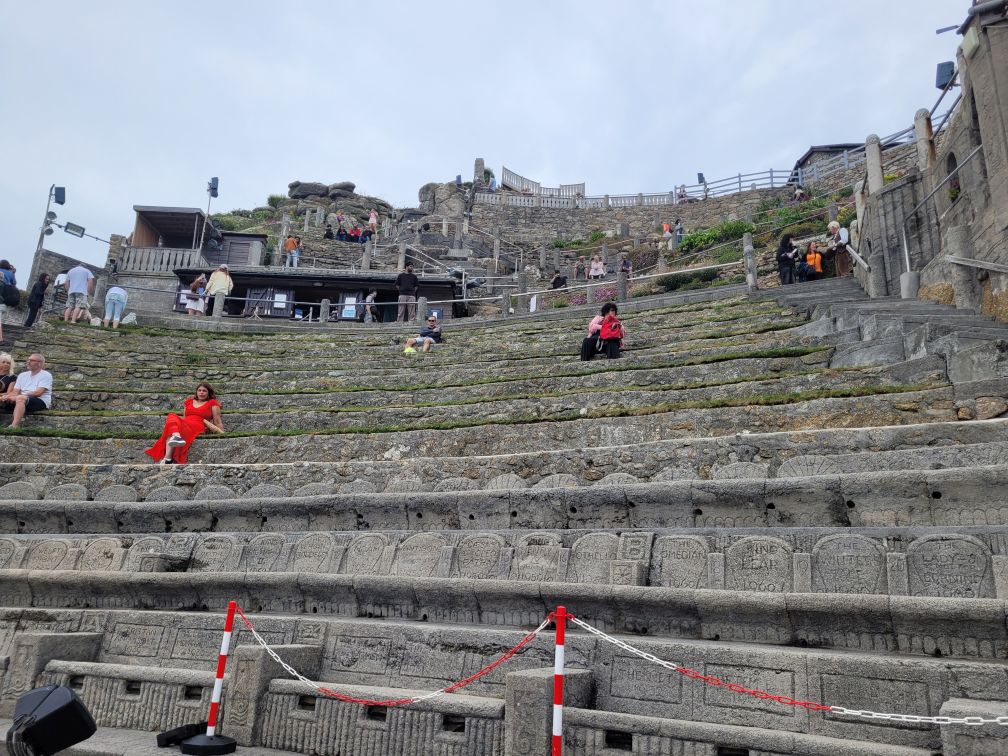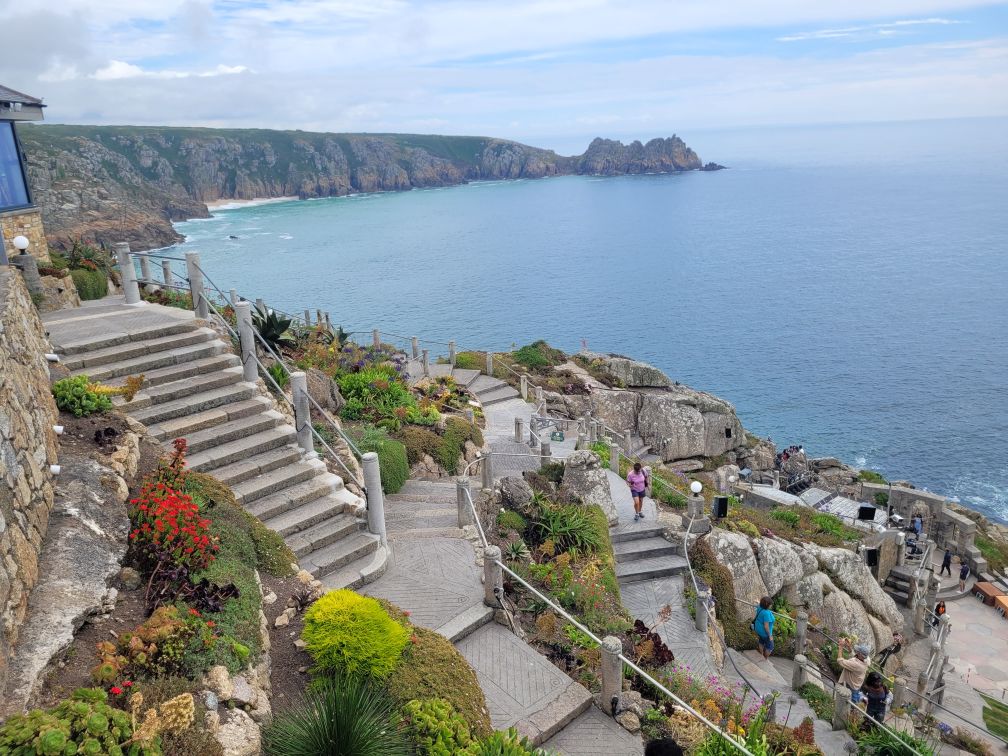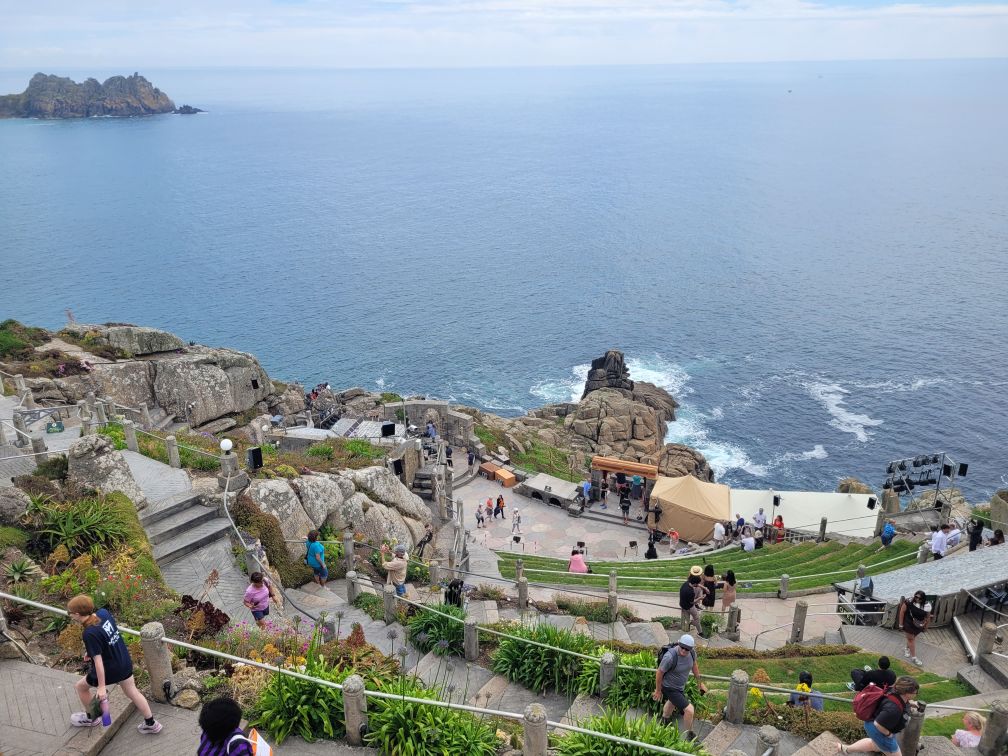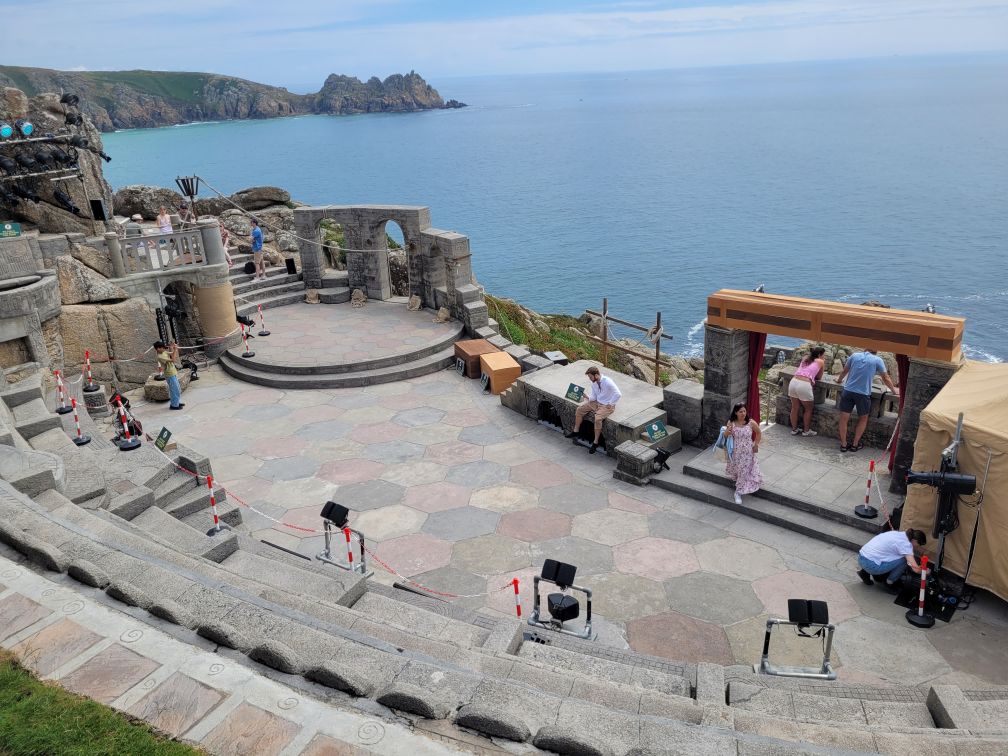By Mike May

While many fans of ‘live’ theater focus on making trips to London’s West End and/or to New York’s Broadway to see popular and highly acclaimed theatrical productions, one of the world’s most unique and breathtaking venues to watch a ‘live’ show or musical can be found in the great outdoors in the southwestern section of England. This ‘living’ monument to ‘live’ acting, singing, and dancing is called the Minack Theatre, which was built in the county of Cornwall, just a few miles west of Penzance and a few miles east of Land’s End.
Believe it or not, but the Minack has been in existence since August 16, 1932. Simply put, very few, if any, descriptive words exist in the English language to accurately describe the Minack Theatre and what it’s like to watch a musical or play performed here. You truly have to see it to believe it. And, once you see it, you may not believe it.
The layout of the Minack Theatre is both a positive and a negative for set designers.
“Our stage is a challenge for designers, being moulded by the contours of the cliff with most of the audience seated high above the actors. But, there are compensating advantages – we can use fireworks and some very special effects as part of a performance,” said Rebecca Thomas, Director of the Minack Theatre.
Under the guidance of founder Rowena Cade, this theatre has literally been carved out of the side of a seaside cliff, as it overlooks the Atlantic Ocean in the near distance. Right now, there is seating for 500-700 people. At the Minack, the ‘live’ performances start around Easter and continue into mid-October, though there are special seasonal performances in the winter.
But, for the most part, the winter is a time to refurbish the Minack Theatre for the following spring, according to Thomas.

“During the winter months we are busy working on the maintenance of the site, which is quite fragile, and undertaking essential building and refurbishment works, while our gardeners are reseeding and nurturing the grass on the terraces, which gets heavily worn by feet (and bottoms) during the summer,” said Thomas. “We’re also very busy preparing for the season to come. With over 40 different shows taking place during the summer, there’s a lot of preparation to do with the companies and setting up all the promotion and ticketing.”
Since every production is conducted outdoors, there are two major factors which can impact every production: the weather and marine life.
“For us, wind is generally a worse problem than rain,” said Thomas. “It is our policy to play in rain, unless it is unsafe for actors or audience. Though, if the forecast is awful, we may cancel a performance in advance. Nature always plays an elemental part in the drama. The silver trail of moonrise over a dark sea is a regular event that outshines the best lighting design in the world.”
Unlike the weather, which can be forecasted, the arrival and impact of marine life is always a surprise.
“Animal performers also take their turn in the spotlight,” said Thomas. “Many a show has been gate-crashed by a pod of dolphins crossing the bay or a cheeky seal bobbing up round the Minack Rock, while diving gannets frequently entertain the audience before the performance.”
While a number of talented and famous actors and actresses have performed at the Minack Theatre, they are never the stars of any given performance.

“The theatre itself is the true star!” said Thomas. “Quite a few notable British actors have performed here, often in their early years, but not many that are likely to be familiar across the Atlantic. Older people might remember Michael York (Cabaret, Three Musketeers). He played Romeo on the Minack stage in an Oxford University student production in 1963. Five years later, he was cast as Tybalt in Franco Zephirelli’s iconic film of the play. We’ve also had some big names in music, including Suzanne Vega and Midge Ure, though not on the same bill.”
Of all the many unique and memorable performances in the history of the Minack Theatre, one of them was tied to an international tragedy. On April 14, 2012, the Minack Theatre staged a midnight matinee of Titanic – The Musical to mark the centenary of the loss of the ‘unsinkable’ ship.
“The performance began at 10:40 pm, timed so that the moment our ship hit the iceberg would be 100 years to the minute from the actual event, apart from a difference in time zones, but this is theatre!” said Thomas. “The Atlantic Theatre Company was formed specially to create this project, but no-one could have planned the day that unfolded. The weather was freezing and early that afternoon the theatre was hit by a violent storm of hailstones which did not melt. The cast, crew and staff frantically shovelled a frozen blanket from pathways and seating, and the audience arrived to find piles of ice still heaped around the terraces.”
As the Titanic – The Musical sailed towards its climax, a dark shape slipped into the bay and when the crew of the Titanic fired off their distress flares, they were answered by more flares out at sea as the Penlee lifeboat appeared off the Minack Rock.
“A training exercise had secretly been arranged to coincide with the performance,” confirmed Thomas.
While the majority of the performances at the Minack take place at night, the evenings are not the only showtimes. When students are on their summer holidays, there are usually matinee performances on Tuesdays and Thursdays plus family storytelling shows on the weekdays where there’s no matinee.
“And, our education team works all year round with local schools, community and social care groups providing access to creative arts training, activities and opportunities for all ages, especially the young,” added Thomas.
“The Minack is a charity, and the preservation of this unique place is entirely funded through the income from our visitors and the shows we put on. We are also proud to be part of the West Cornwall community, and our revenue enables our education team to work extensively with local schools, community and social care groups, providing free of charge access to creative opportunities for all ages, especially the young. This is an important part of our remit in preserving the legacy of Rowena Cade,” added Thomas.
The Minack Theatre – www.minack.com – awaits your arrival.


